21st C Literacies: Same only Different?
 I've been reading
I've been reading about the use of the term "21st century
literacies" - is the term meaningful, accurate, useful... ? This is an important conversation - perhaps more for the process and educational journey than for a definitive outcome.
But for the most part the dialogue appears to focus on '
new media literacies' and the changing (21st century?) contexts of information/communication.
What I would like to see in this dialogue is a discussion of some other
literacies - social and emotional literacy, environmental literacy, spiritual literacy...
Literacies that are also essential to function, participate fully and be healthy and successful in the 21st century.
Are these
literacies? That depends on how one defines a literacy. If a literacy is defined as the ability to
- READ - access and interpret a 'language'
- MAKE MEANING - critically reflect on the value and meaning of the information communicated
- WRITE - successfully and meaningfully communicate or take action
in order to function effectively, participate fully and prosper in the world then I think we can - and should - talk about more than the basic '3R' literacies of reading, writing and arithmetic.
Social and emotional literacy? Communicating about relationships and feelings - the so-called '4th R' - relationships. The ability to access and interpret social and emotional language - eg body language, personal feelings - perhaps the primary language of intrapersonal and interpersonal intelligence.
Environmental Literacy? The ability to access and read the natural world - an essential indigenous literacy and - in the light of current global challenges involving natural systems - an essential 21st century literacy. Is this the primary language of naturalistic intelligence - leading at higher levels to the ability to commune with nature?
Spiritual Literacy? The ability to access and read the deep and sacred in everyday life - an essential literacy for finding deeper place and purpose in the universe. Is this the primary language for a spiritual or existential intelligence - and an important aspect of what it means to be a healthy whole human being?
Some argue that these literacies are not new - we could just as easily label them 2oth century literacies. And this may be more accurate given that we could also argue that fundamental educational change has largely skipped the 20th century :-)
Are there new 21st century literacies? Or are we talking about the same literacies in a different 21st century context? These are worthwhile conversations but we should also include the possibility of more than just 'multimedia' or 'new media' literacies.
What other symbols/meanings/languages do we need to be able to read and understand and communicate in the 21st century?
.Labels: 21stCentury, communication, literacies, spirituality, systems, worldviews
Declaration of Educational Goals: ICTs
 MCEETYA
MCEETYA are seeking input on the new
National Declaration on Educational Goals for Young Australians for the next decade. See
previous post.
The "rapid and continuing advances in ICTs" that are "changing the way we share, use, develop and process information" and the "massive shift in power" to learners features in the draft preamble of the new declaration. But it also calls for a "quantum leap" in our knowledge of effective ways of embedding ICTs in learning in schools.
One goal refers to learners who are "creative and productive users of technologies, particularly ICTs" and the preamble identifies the need for "digital media skills" and to be "highly literate in ICT".
Some are disappointed however that the 'commitment to action' section only mentions
- maximising the use of the latest technologies in teacher professional learning (d)
- integrating key multidisciplinary perspectives into the curriculum which includes ICT (e)
- using new technology to minimize red tape and make information easily accessible to the public (g)
To some this appears odd given the focus in the preamble, the current Digital Education Revolution national agenda and the level of detail in the DER strategic planning documents.
Perhaps the draft declaration needs to include something about using ICTs to achieve each goal - and some/many of the 'commitment to actions' - or is that assumed? Can we assume anything if we are talking about the need for "quantum leaps" in effectiveness?
Should the document include something about using ICTs to
- enable personalised learning?
- create safe and developmentally appropriate spaces for blended learning, communities of inquiry and digital folios?
- facilitate assessment of, for and as learning?
- bridge formal and informal learning - including computer game and special interest 'affinity spaces'?
Or perhaps given the ongoing rapid rate of change in ICTs to 2020 we need to rethink our approach in this area?
How can we be ready for powerful mobile computing, complex virtual worlds, sophisticated games AI, highly interactive media, ubiquitous geo-tagging, and many more ... as they deliver new affordances in education? Particularly when they are likely to be delivered directly to most (but not all) learners? And particularly when learners won't necessarily 'see' either the new ICT or the new affordances?
How can curriculum, learning, teaching and assessment be much more responsive to this rapid change? How can we keep the focus on learning, teaching and assessment without being distracted by shiny gadgets with short lives? How can we reduce the professional learning burden on teachers?
What other questions should we be asking and which assumptions should we be questioning?
Perhaps this is where we need a 'commitment to action'.
.
Labels: 21stCentury, curriculum, ICT tools, literacies
Designing Courses: Learning Areas and Capabilities
I've been playing with models that might clarify the process of designing courses in order to provide for
all students under the new Post Year 10 Curriculum Framework for Tasmania. I've also been reading about the
current call for a "back to basics" national curriculum and in particular thinking about
Alan Reid's proposal's in
Rethinking National Curriculum Collaboration - but within a State rather than national context.
(School education is the constitutional responsibility of the States in Australia.)Before the current PY10 Curriculum Framework was developed the structure of the curriculum was hard to conceptualise. In the late 80s and early 90s traditional subjects were loosely grouped into 'learning areas'; new programs to support literacy, numeracy and ICT literacy were developed; new courses emerged and some stayed; student support, health and well-being and career/pathway options evolved; key competencies/capabilities were identified...
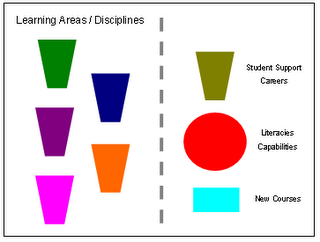
However much of this sat outside traditional subjects/leaning areas - conceptually and often in implementation as well - or sometimes uneasily within syllabuses and timetables as attempts were made to "embed them".
Syllabus development most often occurred within subject/learning areas and tended to reinforce existing knowledge structures, ways of learning, teaching and assessment. New courses often failed to gain a foothold if they did not fall neatly into traditional ways of organising knowledge.
The new PY10 Curriculum Framework is based on agreed values and purposes arrived at during a long period of co-construction. We are currently looking at the structures and processes that might inform the provision of courses within the Framework. What range of courses will be available to choose from?
While we now have a State Curriculum Framework individual year 11/12 schools will be responsible for implementation to meet student needs in local contexts. Which courses will schools choose to offer their students? And how will individual classroom teachers interpret these courses?
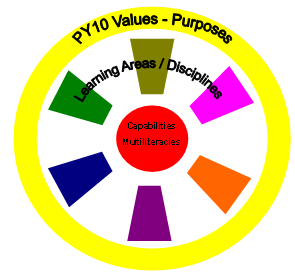
(NB In this graphic the number of learning areas is arbitrary.)
A key question at the moment is what sits between the values and purposes and the capabilities/literacies? What are the contexts for learning? Can we move away from learning areas? Should we move away from learning areas? Following Reid's suggestion (in the above paper) can we develop courses where students learn for the capabilities through the learning areas - leaving the details of what learning to schools, teachers and students?
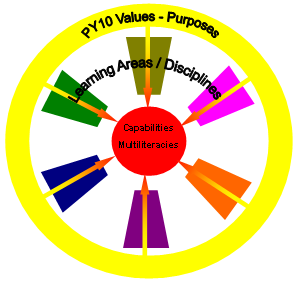
Or will existing ways organising knowledge/skills and their associated communities of practice work against providing opportunities to develop all the capabilities required for the 21st century? Will anything really change if traditional learning areas still dominate structures and processes for course/syllabus development.
And where do transdisciplinary approaches fit? How do we move beyond disciplines to engage in the kind of rigorous thinking that is needed to meet today's societal and planetary challenges? Can we construct valued learning experiences/courses that exist in the space between the disciplines and their well developed resources/support structures/dialogues?
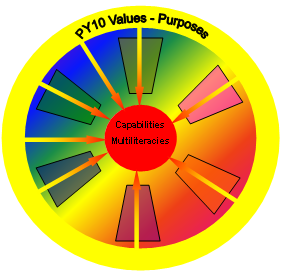
Perhaps we need to use other lenses/conceptual frameworks to help us create courses/learning experiences that help students to make meaningful connections beyond subject borders and to "know what they don’t know". Can we generate meaningful content/contexts by asking the big questions? Is an 'integral' lens useful as a conceptual framework?
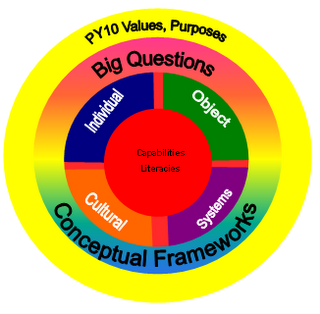
Perhaps course developers and classroom teachers (hopefully the same people) need to draw on a course development toolbox containing a variety of conceptual lenses... A learning ecology/connectivism framework such as the following by George Siemens that looks at "know where" as well as "know-how" and "know-what" might be one tool.
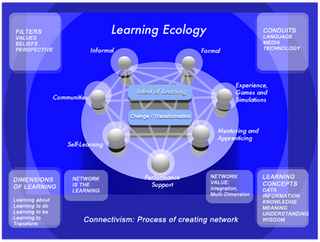
And how can we establish course developement models/principles that ensure the ongoing currency of courses in today's rapidly changing world?
Labels: 21stCentury, conceptual frameworks, curriculum, learning, literacies, transdisciplinary
Literacy of Cooperation
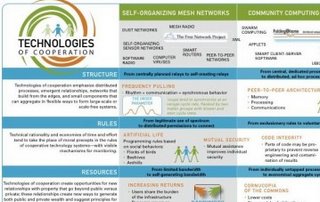
Just came across a great poster 'Technologies of Cooperation Map' outlining (defining?) Web 2.0 (without mentioning the word) on the Literacy of Cooperation resources page. Certainly gives a big picture!
Also some interesting videos and links on 'cooperative technologies', 'emergent democracy' and 'collective intelligence' including presentations looking at the creation of civic spaces and motivators for cooperation such as saving the world and love...
Link via Alex Steffan at WorldChanging
Labels: collaboration, communication, literacies
 I've been reading about the use of the term "21st century literacies" - is the term meaningful, accurate, useful... ? This is an important conversation - perhaps more for the process and educational journey than for a definitive outcome.
I've been reading about the use of the term "21st century literacies" - is the term meaningful, accurate, useful... ? This is an important conversation - perhaps more for the process and educational journey than for a definitive outcome.










